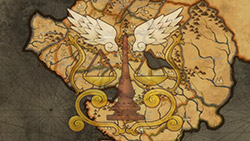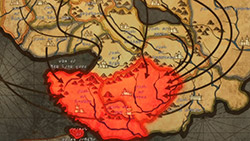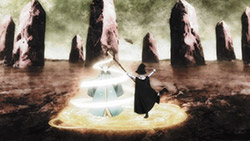 |
 |
 |
 |
 |
 |
 |
 |
 |
 |
 |
 |
 |
 |
 |
 |
 |
 |
 |
 |
 |
 |
 |
 |
 |
 |
 |
 |
 |
 |
 |
 |
 |
 |
 |
 |
「あの人が置いた布石が、いよいよ意味を持ってくるのか」 (Ano Hito ga Oita Fuseki ga, Iyoiyo Imi o Motte Kuru no ka)
“So Now Their Plans Are Finally Coming To Fruition?”
Covering a typical Maoyuu episode is a mental workout. In the space of a single episode events so major that they’ll take years to fully unfold were laid on us, with serious consequences for the entire human world. I’m not sure I got everything that happened, but I’ll try to lay it out. For you.
“There are two, so pick what you like.”
Setting belief aside, when a nation gives power over itself to an outside entity, they had better have a damn good reason for doing so. While some may even argue over whether something like the United Nations is a good deal, the one the Southern Triad has with the Church is not one on any level. They allowed the Church to wield power over them for its own naked benefit, and they got absolutely nothing in return other than demands and insults to their sovereignty. That means there’s only one thing to do…
I’m reminded of a quote from one of my favorite authors, Terry Pratchett: “Thou shalt not submit thy god to market forces!” (Small Gods) That’s right – competition! If the Church has a monopoly on belief, break it. It looks like they have their own little Protestant Reformation on their hands, and it’s a good thing too, because though this will make things more difficult in the short-term, it will help them in the long-term. Even if the Church were not so corrupt, having so much power concentrated in a single outside entity is dangerous. Better to introduce a little competition to the world, to keep them on their toes. Viva la free market (of belief)!
Holding the Economy Hostage
Speaking of free markets, Seinen Shounin spent this episode doing his best to twist the hell out of them. Now, you’ll have to pardon me on this, because while I am a master of politics, strategy, and the written and spoken word (which aided me greatly in covering explanation-heavy Kyoukai Senjou no Horizon), when it comes to economics I’m a little more uncertain. I’ll try to lay it out for you though, and any econ gurus are welcome to post corrections in the comments. Feel free to skim this section if you don’t care about the gritty details.
As near as I can tell, Seinen Shounin held the economics of the Central Nations hostage through buying and selling wheat futures. Now before I start, keep in mind that the key to everything that follows is uncertainty.
Okay, so what the Alliance did was go to all the wheat producers and say “I’ll buy next year’s crops for X, here’s the money now.” From the producers’ points of view this was a great deal (at the time) because it decreased uncertainty – they already had the money in the bank, so they didn’t have to worry about getting paid. Now all they had to do was produce the crop. Yet remember that a good businessman will never do a deal where he stands to lose money if he can at all help it. The producers locked in a price, but so did the Alliance. That means that if the price drops, the producers win out. If it rises, the Alliance will make a killing.
Oh look, there are no laws against market manipulation, one of the parties [the Alliance] is large enough to seriously distort the market, and no one can stop them. Guess what happened!!
The key is still uncertainty. When people are uncertain, they hoard. They hoard money, they are hesitant to sell their essential commodities (such as food), and if they do sell, they’ll sell it at much higher prices. So the Alliance starts buying wheat (not just the futures, but the existing product), which decreases supply; thus, the price goes up. Merchants see that the price of wheat is rising faster than it usually does, so being the silly humans that they are, they assume it will continue to rise (“The housing market is going up, and it will never stop going up eeeever!” *crash*). That means it’s in their best interest to either hold their stock and sell it tomorrow, or sell it now at a higher price…which of course drives up the price for everyone either way. In effect, because everyone believes that prices will go up, they do. It’s a self-fulfilling prophecy, not to mention a medieval sociologist’s wet dream.
Meanwhile, uncertainty grows because of the war brewing with the Southern Triad, making people more hesitant to sell what they have, more likely to hoard. But it won’t work. Unfortunately for them, Seinen Shounin has taken inflation and dialed it up to 11. Money is always eroding in value unless it’s spent or invested; this is as true in our world as it is in theirs. But the levels we deal with have been small in recent years, manageable – maybe 2-3% a year (in the developed world). Now the Alliance has ramped inflation up to levels approaching the hyper variety (though they’re not there yet! …yet). Everyone is losing money, and the money they have is worth less (you listening, creepy noble guy?). And through all of this uncertainty, the only thing that’s certain is that the Alliance is going to make a lot of money. Maybe. If they don’t smash the board to pieces in the process.
I’ll finish with two quotes to cap off this impromptu economics lecture. First is from the esteemed Warren Buffett:
“Be fearful when others are greedy, and greedy when others are fearful.”
That’s why Seinen Shounin said that they should buy up all sorts of things – not just wheat, but iron, charcoal, and silver too. Uncertainty is high, so people are scared, meaning those prices are liable to rise. Though of course, it’s not only that – he plans to use that uncertainty to make the possible war into an inevitability, and then sell those commodities when the prices are higher. Clever girl. The Buffett quote is still a good one to live by, though.
Now one from Maou herself:
“Keeping all the wealth for yourself may make you rich, but it won’t make you prosperous. You give people money and they spend it. True prosperity comes from a free flow of wealth and goods.”
To put that another way, money likes to get out there and play! If you leave it sitting in the bank – or worse, under a mattress – inflation will slowly eat away at it. That’s not to say that you must spend it – I’m a big fan of investing myself – but the point stands. Though I used a quote about greed before, the short-sighted kind of greed that impoverishes everyone else (you listening, Church?) will enfeeble you as well. You may become rich, but the world will be poorer, and that money will buy you less than it otherwise might. I’m not sure that I really had a point here, I was just impressed that such a deep economic point was in an anime. Moving on.
Seinen Shounin & Karyuu Koujo
Is it just me, or has Seinen Shounin turned his eye towards Karyuu Koujo? Consider me aboard this ship, though not for fangirling reasons. (Okay, not just for fangirling reasons.) I never once considered Seinen Shounin a viable candidate for Maou’s affections, so that angle was pointless once it stopped being amusing. Yet if Seinen Shounin were to become somehow involved with Karyuu Koujo…well, that opens up all sorts of possibilities that I cannot even begin to fathom. Most of all though, it may fulfill his end of the contract with Yuusha – to “find what cannot be expressed in loss and profit.” I once guessed in passing that it might be love, but I think it’s closer to a broadening of his horizons, of growing as a person. Whatever the case, Karyuu Koujo may just be the key. Very interesting indeed…
Maou’s True Form
Pardon me while I freak the fuck out. TWINTAIL FRENCH MAID MINI-SKIRT THIGH-HIGHS MEIDO CHOU!?!? TWINTAIL BOOK NERD CLEAVAGE SHORT DRESS MAOU!?!? *dies from the sexy overload* *resurrect yes/no?*
Ahem. Anyway, this does expose the reason for Maou’s genre savviness (trope!) – she’s a nerd! I think there is a lesson here for all of us who love stories (which is every single one of us – anime counts): you can read until your long days pass you by, but there is no substitute for the story you create yourself. That’s why Maou got out of the library and went into the world, to see a story that had never been told before. We all should also endeavor to tell a wonderful story, lest life pass us by and we end up having told a boring one.
Final thought: I like how Maou opted to spend only the bare minimum of time in the Demon Lord room, sacrificing a true maou’s combat abilities for retaining more of herself. A very smart choice. Rather than a rehash of her predecessors, what the world needs now is a new kind of maou, one who would rather talk than fight. And when there’s fighting that needs be done, she has Yuusha. Awwww!
Looking Ahead – A War in Winter
Thanks to Shounin Shitei’s tariffs, the Southern Triad was spared the economic damage of Seinen Shounin’s inflation by making it more profitable to sell their wheat within their borders. Alas, that was their only chance for a peaceable settlement, even if it would have likely come with the Southern Triad’s starvation (a smart choice on their part, I’m just saying). Now it’s time for war! Tell me – am I the only one who instantly thought about how unwise it is to invade a cold country in the winter? Granted, I don’t think they’ll have to contend with General Frost, but the Central Nations leave themselves with only 2-4 weeks to get the job done.
That’s why it’s up to Toujaku Ou to keep them at bay! With no casualties, if possible. You may call that naive (few casualties would certainly be more realistic), but it’s also important – a minor scrap with naught but injured pride can be brushed off with later diplomacy, but blood on the ground is hard to wash away. Fight well, boys. Just not too well.
tl;dr: @StiltsOutLoud – Commodity futures, religious reformations, new romantic ships, ohandalso TWINTAIL MAOU & MEIDO CHOU WOOO!! #maoyuu
Random thoughts:
- I enjoyed how they played with naivety this episode, not just with Yuusha, but with Meido Ane as well. In rejecting the song idea, I thought she was going to get all idealistic, but no – she just wanted to advertise the country, not the religion. Smart.
- If you want to learn more about commodity futures (stay with me here…), I suggest you watch Trading Places. In fact, I suggest you watch it anyway, even if you’ve seen it before. Dan Aykroyd, Eddie Murphy, and Jamie Lee Curtis back when they were good? (Well, Jamie Lee is still good, but you know what I mean). Easy sell!
Full-length images: 13, 31, 32.
Preview
 |
 |
 |

It’s not just you. I still wish she looked like she does in the manga, but… anyway, you’re not the only one to see this as a ship.
This part of the story was when I really started to like Karyuu Koujo as a character.
Talk about cradle robbing! That is a little too young to be lusting after miss maou 😛
Stilts, I’m sorry, but you’re only on par with the in-anime explanation on economics this time around
ie. Anime 1, Stilts 1
I’m more surprised that they have a twin-tail phase instead of something more similar to teenagers…
…but then the look on Maou’s face when she’s looking at the baby Yuusha puts the weird back in place.
Whats the problem with breaking board? I REJECT YOUR REALITY AND SUBSTITUTE MY OWN!
Because money only works if the system that says that money has value still exists. Defying the system is one thing – smashing it to pieces loses you everything you had invested. Not good when all your investments are collected in the mass dream that is money.
Especially if new people end up in charge and decide to make brand new money and declare the old regime’s money as valueless. Thats why many folks invest in gold and silver.
While Young Merchant is aware that breaking the board is bad, he is smart enough to protect himself in case something goes wrong. (ie: the value of money goes down so low that it is virtually worthless) By stocking up on wheat, coal, etc. stuff he’s pretty much safe in the event of a worst case scenario and society goes back to a barter economy.
Btw, when was “Money” (How we know it today) Invented? 🙂 And how was Stuff “payed” in the Past?
I think “Money” was invented by some Italian Merchants..If i remember correctly. Before that there was “item/Vale” Trades
@Karmafan, et al.
The day to worry is when people stop investing in gold
and/or silver or for that matter, anything you can’t eat.
Reminds me a lot of the big themes in C: Money of Control and possibility.
Oh Stilts, such simplistic thinking. Why not smash the board and replace it one of your own design for everyone to play by? All I can see in that case is profit and a truly fitting move for a conglomerate of merchants. Hence my statement, “I reject your reality and substitute my own.”
Breaking the board IS essentially what he’s doing. it doesn’t really matter how far the currency’s value drops, all you need to do is replace the old board with a new one. and judging by how much he’s hoarding, i’d say he’s got more than enough material for a new one.
True, breaking the board works if you’re in a position to replace it. I’m not sure Seinen Shounin is. Besides, the general board they’re working with (capitalism) is fine, they just need to make some tweaks to make it less horrendously destructive to certain (see: most) people
Well I didn’t really mean replacing the system, but rather introducing a new currency. And I’m willing to bet it’s going to be wheat itself, judging by how much he’s hoarding.
head maid’s older style for the win!
I think the quote from Maou is meant to be taken in a more holistic view. Maid Ane used the quote during a discussion about not just economics, but about the Central Nations and Church trying to keep their position entrenched at the top of whole societal structure. So while it’s talking about needing to keep wealth flowing in an economy, I think there’s a much more idealistic “money can’t buy happiness” (or in this case peace/justice) vibe to what Maou is saying. Or it might simply just be the author saying wealth inequality is bad for society. No idea if that’s the intention or not, but just saying Maou’s quote seemed to be talking about more than just economics.
On a lighter note, did not expect Maou to be a crazy shotacon lol. “He should be pretty handsome in 15 years.” Danger zone there Maou!
Yeah, she’s a real demon for going crazy over a baby-boy.
Kinda pissed me off that they had a recap episode last week. Its only a 12 episode series so why have a recap after 9?
Perhaps Episode 9 can create Riots in some Countries… And they have some “Visitors” that was not Amused
After reading the manga, I can’t go back to the anime. The manga has more charm, less filler (takes less time to read), a broader explanation of things, and many more. If you have been following this series, I suggest you give the manga a read.
Nope from me. Because Mange tells you the Future of this Anime. So, read Manga right now take your Curiosity away. Beware reading Manga is a Curiosity eating Demon 🙂
If you like the Anime, dont read the “Forbidden” Book (Manga), cause you will lose Curiosity. Like i did it with Magi.. I learned my lesson
I meant completely switching from anime to manga. For once, it’s a better and more complete telling of the story.
Ah that, well i reading Bleach, Fairy Tail, Magi, Zettai Children, Magican, Oh My Godness and other as Manga only
But i have some Anime only as well. Maoyuu Maou Yuusha, Sinsekai Yori, Little Busters as example
Well this adaptation is about to be over, so soon that will not be a problem!
P.S. I am planning on reading the manga later on. Hopefully. If I have time *whimpers*
Yeah, leggy Maou & Meido Chou in twintails was HNNNNNGGGGGGG inducing. I had to pause a moment.
As for the economic bits, one REALLY important point to keep in mind: the loss of Potatoes as a new staple crop was going to drive Wheat prices up regardless. (They’d have dropped as the Southern Countries had drastically lessened their need) Thus, the Young Merchant was actually locking in all of the prices at a fairly low, right before a natural rise happened.
But, once they locked up much of the futures market (or created it, actually), even a small amount of purchasing heavily in 1 area could have easily set off the rolling “panic” through this world. (This is still a world with a heavy time-lag of weeks for information) By buying up probably only 10-15% of the available stock in the Central Country capital, the outlying shock alone should have set off the panic. But, since
“Wheat = Main Food = Life” in this world, suddenly a shock in the Wheat price sends everyone into a panic. It’s known as an inflationary spiral, but it’s for the Currency. The totality of the value of the currency is plummeting, so anyone hording is actually losing a massive amount of “value”. But, hard goods are massively increasing in valuation.
Add on top of this that armies cost Money and Food, and the Money is about to lose probably 75% of its value while the Food is going to increase 4-5x for cost. That’s a BAD place to run a war. (Should I point out that most of the War deaths would probably be due to Weather/Disease and not the War itself?)
Ohoho, you explained that stuff better (and more quickly) than I did!
Read this, interested souls. The points about the cost of money and food are good ones.
Oooooh boy…we’ve got another Jacob/Bella’s kid situation.
On another note, what’s happening with The Mage? We just see Maou meet with her once without any explanation, and then she’s sending Dragon Princess to see Merchant and tease ships. Wasn’t she supposed to have more role in the story?
Or the blue demon people. What’s happening with that? We get a kind of explanation of who they are (which is inserted pretty randomly), but we’ve got two episodes left and they’ve yet to have any significance.
Market games, commence! Finally, a free and open market full of healthy competition formed upon a foundation of fair play- oh wait, what this is a medieval fantasy world? Welp…
There are actually good reasons why price manipulation and market power are heavily regulated in just about every civilized nation in the modern world- not in the least because merchants (MNCs and Mom/Pop’s) alike will do literally anything to make more money- the monopolization/cartel control of supply to artificially drive up prices of essential goods like food and medicine is a disgustingly unscrupulous, predatory and inhumane business practice. The poor are shut out of the market and forced to starve/die of disease because they can no longer afford to food and medicine…and voila, we have market-imposed Social Darwinism, isn’t it wonderful?
One of the many reasons why (Besides general economic inefficiency) legislation allowing the state to mandate the divestiture of monopolies and crack down on cartels is deemed to be so essential to creating a healthy market by many economists. Even in spite of all the economic advancements that have been made over last 9 episodes, this world still has a loooong way to go…
Heh… The belief that you must legislate against the seller is a myth. In fact, if anything, it’s the legislature that has done more harm than good in the economy. Economic powerhouses like the trading alliance in Maou and the giant corporations today didn’t get to their high status in the business world because they were stupid. The free market is a system built to feed off of Man’s inherent selfishness, and the providers are going to do all in their power to eliminate anyone attempting to minimize their profit. If anything, legislation made it difficult for the little guy to succeed (In some cases, legislation even created monopolies See: http://www.lppgh.org/2008/02/20/antitrust-laws-actually-promote-monopoly/), and brought us the wonderful world of credit and the consolidation of so much power and control in the market into so few hands in this day and age. Tell them they can’t do one thing just leads them to finding another way to get that power. It’s a lose-lose situation.
Although it’s interesting to note, that this mass conspiracy didn’t affect the Southern Triad. These mass conspiracies rarely succeed over long periods of time, because people are out to protect themselves, they’ll find a way out of it whether through violence or an effective strategy (such as a mass migration to the only place unaffected by this scheme).
The popularity of the Southern Triad is not because it’s powerful and everyone there is rich. Most people there are or were serfs. The popularity of the Southern Triad is because you can go there and have the freedom to successfully provide for yourself and maybe others all the basic needs to live. It’s only a matter of time before the trading alliance attempts to distort that image into a false one where anyone can work their way up in society, and success is measured in how many luxury goods are consumed while introducing credit to enslave people.
It’s just as Maou stated- you can be rich by consolidating all the power and wealth to yourself, but you will never be prosperous. Prosperity is when everyone can utilize economic freedom to provide for themselves. People resent others in power over themselves, and they’ll correct anything subverting their newfound freedom if they can.
Interesting to note is southern kingdoms being wintery… Yup, if Hitler and Napoleon had anything to say about invading very large populated areas that are cold and wintery, it would be “Don’t bother.”
Hmm, so you’re a pro-pure laissez-faire libertarian in terms of your economics. I understand your perspective, and I see why it is said by the leaders of your camp that allowing the invisible hand to work its magic without any restrictions beyond the criminal allows the market to operate at maximum efficiency. And at maximum efficiency, the market forces will self-regulate to ensure that limited resources are always fairly distributed among self-interested individuals.
Perhaps you are right. Perhaps pure laissez-faire does in fact maximize efficiency distribute scare resources in the fairest way possible by operating through human selfishness. But it is also precisely because of human selfishness that pure laissez-faire will probably never again be a thing in the economic north.
A significant amount of educational attainment is usually requisite to understanding the workings of the libertarian economic model, which at first glance seems to controvert all traditional notions of human ethics and morality- of course, the philosophy in of itself seeks to do nothing of the sort- rather it seeks to achieve the greatest moral good through the free operation of natural market forces. But even if it does indeed do so, it does so in a completely unintuitive way- by mandating the deprivation of the poor (in relative terms) masses in times of scarcity so that the efficient distribution of resources can eventually stimulate the economy into recovery by placing goods in the hands of those who need them the most, and more resources in the hands of suppliers (While also encouraging them to increase supply through higher profits).
Under this model, price-gouging during times of crisis is a perfectly acceptable practice- it will in theory eventually lead to restored abundance through maximized efficiency, but the problem is that it literally mandates a period of deprivation for the less well-off. If an earthquake hits and causes a food shortage in a pure laissez-faire market, there will inevitably be a significant period of time in which the poor, predominantly uneducated masses will be cut off from feeding their families by high prices. And even if through enduring a period of hunger, they will indeed be better off for it in the long run, without the understanding of economics that comes with higher education, the vast majority of them will not be able to see beyond the immediate harm dome to them and their families.
And in our liberal democratic system, every one of these disgruntled working-class citizens will bring their woes to the ballot box. The libertarian politician who allowed price-gouging during a time of crisis because he ostensibly knew that it was for the greater good gets voted out of office. Of course, self-interested politicians would never allow this- so they introduce legislation that bans price-gouging in times of crisis. And a minimum wage is set up, again so that the offices of politicians are not put into jeopardy by the hunger-induced wrath of the masses “left at the (what they see to be cruel) mercy” of market forces.
So even if pure laissez-faire capitalism is in fact everything that it is touted to be by libertarian economists and more, whether such a system is actually politically viable under current northern governmental paradigms is questionable. Short of the pipe-dream of universal economic higher education, or the horrors of fascism- the current economic system is probably, and to some lamentably, here to stay; it is, for better or for worse, a product of forces that transcend even those of the market- the forces of the human condition in of itself…
Price gouging isn’t as inhumane as you think. It encourages economizing, as well as attract many entrepreneurs, as high demand means high pricing. For example, in this earthquake devastated country there is now a high demand for food due to food shortage. That means families take what they can manage, and it leaves more for the rest. Fixing the price causes a run on food (Or other needs, see: Gas crisis in New Jersey), and you get social-darwinism. I’m pretty sure you’d want to avert that. The high prices also attract farmers outside the country who see the potential for profit to come in and sell, which creates more supply. And it’s not as if the damage done by disasters is permanent. http://mises.org/freemarket_detail.aspx?control=417
http://www.thedailybell.com/28285/Ron-Paul-In-Praise-of-Price-Gouging
Now onto what has happened in the world of Maou Yuusha… I don’t think this was an exploitation of the market in the sense you and Stilts are making it out to be. Maou made a naive and critical error in her plan. Her plan was to implement all of her new farming technique ideas, and by the time the southern nations were reaping the benefits, she’d utilize technologies she developed to increase communication so that her ideas would freely spread to the central nations and throughout the world. Her error was that she believed in a perfectly free market, something that even Libertarians see as just a dream. She didn’t count on the corrupt leaders of the central nations (who saw her ideas as a threat to their power) to close their nations off to her ideas out of spite and hatred. So while the southern nations thrived, the central nations remained in their archaic ways. The Independent trading alliance, who had been doing exclusive services with Maou, with Seinen Shounin learning much with his interactions with the crimson scholar, took the unfair intellectual advantage they had over the markets in the central and exploited them. Had Maou’s plan accounted for this so that her ideas would have been spread to the central, it’s likely that the Central doesn’t fall for this ploy or isn’t hurt as badly as they were.
Even if it does this, it does so in a manner that is morally reprehensible to virtually any person who is not a libertarian and/or an economist- which is (woefully or not) the vast majority of the populace. In times of crisis a perfectly free market guarantees a significant period immediately afterwards where the rich are able to to feast in abundance, while the poor masses are forced to fester in starvation because they cannot afford to feed themselves. This may result in a greater abundance of food further down the line, but un/fortunately this glaring disparity between the rich and the poor is something that offends the moral sensibilities of most modern men.
The problem with essential goods like food, clean water and electricity is that a “scrimp today, indulge tomorrow” argument of utility is more easily questioned than with other non or less essential goods like batteries, gas or toys. It could be plausibly said that forcing the poor to starve today for a healthier economy and lower prices tomorrow is not a morally proper assessment of utility.
Because the thing about food is that in many cases, having a little food now is far more valuable than having an abundance of it sometime in the future, say several years after the disaster when the rebuilding is done. Why? Quite simply because if you don’t get enough food/clean water today, you die- or if you are a child, suffer from irreparable developmental damage due to malnutrition. It isn’t like batteries, cars or toys where you’ll be perfectly fine physically if you don’t have it right now; where your body is not damaged for a lack of something in the present, it is far more easily argued that you are better off forgoing it today for more tomorrow. But where you would suffer (often irreparable) bodily damage for a lack of it, the future value of a commodity is arguably irrelevant- what good is more food in a year when markets have recovered if you’re dead of starvation by then, or if a child has suffered irreparable developmental damage? And at our current level of technological development, it is virtually impossible to rebuild the infrastructure requisite to restoring the market to its proper equilibrium quickly enough to avert a situation where millions will starve and children suffer irreparable developmental damage from malnutrition.
Therefore to preserve human life and the futures of our children, even if fixing the prices of essential goods during times of crisis does in fact lead to a less efficient market and somewhat higher prices in the long run, perhaps it is a necessary evil. Feeding the poor today through fixed prices may indeed mean that they will have it harder in the future because of the higher prices caused by a less efficient economy; rather than feast in abundance, they will have to live in moderation- but this may just be a price that we as a society have to pay, because the alternative would cause such immense and irreparable immediate damage to human life.
Let us assume that the theory behind this is sound. But in practice, rebuilding efforts after a major disaster (Think Haiti Tsunami) take years to complete, and the market cannot be restored to a proper equilibrium until the infrastructure to support it is back in working order- regardless of how proactive investors are being about rebuilding, construction can only occur so quickly. And by the time it is done, it will be too late for many.
And even if you argue that a less efficient market tomorrow will cause more human suffering in the long run, this is an argument that you will usually lose in any liberal democratic legislature. Because humans have a tendency to lend greater weight to the tangible; we believe only what we see. And what the politicians, media and general populace see after a disaster is the immediate suffering of its victims- this is reinforced by the voting power of the sufferers themselves. And so the vast majority of politicians will always move to remedy the present harm, rather than taking a possibly (likely according to liberterians) greater future, incremental harm into account.
The libertarian pure free-market is, like the Marxist utopia, an idealistic fantasy. There is harsh expert criticism questioning whether pure free-market conditions would actually produce the paradisaical effects that its proponents purport. And even if we concede that it will, the possibility of ever attaining such a state is likely probabilistically foreclosed by the idiosyncrasies of the human condition. What is the better alternative? Even if libertarian economic theory is indeed true, would movement of the status-quo in a libertarian direction actually bring more benefit to humanity, or would such movement be so at odds with the current system that it would generate a destructive, costly negative synergy in transition? Let that other free market (of ideas) decide…
You don’t seem to understand how immoral an indefensible your position is. So let me ask you a question- Would you rather go with little food or entirely without food? I bet my entire bank account that you’d pick little food. Under a libertarian model, that’s what you’d get. You wouldn’t be able to get much, but much is still something. It’s a temporary hell, but the key word is temporary. If you so desire to fix the prices at a low cost, you run into the cruel prospect of people going entirely without food. Why? Because in a time of crisis like an earthquake, people need necessities because it’s likely their food supply is damaged, house is damaged, water source becomes inaccessible… Ect. Every single person, rich or poor, suffer in this crisis. Fixing the prices means you guarantee someone dies of starvation, because he/she wasn’t lucky enough to get anything in the subsequent mad dash run on food. That’s what happened in New Jersey after Sandy. Gas prices weren’t allowed rise like they should have and everyone ran for the gas pumps, subsequently draining what little supply was left, and people went without gasoline. If they had risen like they should have, the people who needed would have gotten it, and the people who didn’t need it or didn’t need it as much would have just gone without it either entirely or in small amounts. You don’t want that over your head.
Haiti is not a very good example. For one, they aren’t a developed nation, nor do they even have any kind of developed market. Their government is incredibly corrupt. In many cases, they are exactly in the same situation as the Central Nations- they aren’t developed and they’re being exploited because there are no freedoms or a free market developed. It’s not a deficiency in the free market because one doesn’t even exist.
But in a developed country where something resembles a free market, like the US, you see a crisis recovery last anywhere from months (Common) to a couple of years in the worst case scenarios (Katrina).
<blockquoteAnd even if you argue that a less efficient market tomorrow will cause more human suffering in the long run, this is an argument that you will usually lose in any liberal democratic legislature.
American politics are becoming more conservative, actually. But in any case, this isn’t a valid argument. This is just an appeal to the masses, and the masses can be wrong and misled by corrupt leaders (See: Central Nation).
What good is saving the present if you try and haphazardly save it and destroy the future in the process? It doesn’t matter whether you are liberal or libertarian. There’s going to be suffering. You can overreact and try and save the present and destroy the future in the process, or you can give everyone a shot at the future whilst risking the present. People are going to die regardless because it’s a crisis. At least the libertarian model gives people a chance to live. Fixing prices guarantees social darwinism. That’s truly unethical.
If you watched that youtube video featuring Ron Paul, you would have realized Libertarians readily admit a perfectly free market is nothing but a dream. But what can be achieved is a perfectly competitive market, one where there are no barriers to entry and competition abounds. The free market, or at least a perversion of it, is the system that exists in our world. Maximizing its efficiency and ability to operate should be our goal, and Libertarianism aims at that. Look, there will always be poor people. You can never solve poverty. In the case of the Maou, at least a bold goal to carry is a guarantee of being able to provide for oneself with dignity. I think Libertarianism can accomplish that- heck that’s what Maou is advocating: a free market unhindered by corruption and greed.
You prove my point, which is that even if it is temporary hell, human beings won’t stand for it. Even if we assume that libertarian economics is gospel truth, human experience is defined primarily by what we see, by the present- how many uneducated working class citizens who are in starvation after a disaster do you think are going to understand that starving now will save their lives in the long run? Statistics tell us that the answer to this question is next to none. The Liberterian Party is tiny. In spite of being the third-largest political party in America, it has never managed to garner more than 1.1 percent of the presidential vote. Even if it is irrational, the (perhaps sad) truth is that most people would rather eat now even if it means starving later.
Many conservative voters would like to consider themselves to be libertarians, but when actually questioned on the matter, I am almost certain that you will find that pure libertarians who genuinely favor perfect no tax, no regulation laissez-faire are in the minority. Few voters actually fall on the radical right-end of the spectrum of fiscal policy where true Libertarians lay. And here’s another peculiarity of the human conditon, nay mathematics that virtually ensures the political non-viability of a pure libertarian system of economics- the good ol’ bell curve.
The vast majority of the population inevitably falls closer to the middle of the spectrum of political beliefs regarding economics- true Libertarians are a super-minority (Albeit a very vocal one, due to their higher level of educational attainment on average), relegated to the far end of the economic policy curve’s right side with few votes to speak of. Extreme political movements like libertarianism simply are almost never politically viable in a liberal democratic system of government, regardless of their actual theoretical efficacy because they will almost never garner enough political will to be instated as law. In other words, whether pure libertarian economic theory is true or not is moot because it is almost certain that it will never become law under the current system.
Are you sure about that one? In a worst case scenario where all infrastructure is destroyed, under the libertarian model prices might get so high that the poor won’t be able to afford food at all and be forced to starve- this is a completely plausible scenario. A system like the current one where the government provides tax-funded (Another no-no to pure libertarians) food aid to disaster zones, on the other hand, would guarantee minimal food supply in all situations.
And don’t even get started on the libertarian notion that charities will fill in the gaps where government aid is removed. Libertarianism is based on the notion that people are all self-interested actors- where self-interest is the priority, how many people or corporations for the matter do you think would be willing to donate the financially crippling amounts of money required feed the victims of a large-scale natural disaster? What they do give under the present system is certainly significant, but it is still dwarfed by governmental funding- why should we think that they would do things any differently under a libertarian system- in fact they might even end up becoming even more selfish- a lot of donations from wealthy individuals and corporations are done not out the goodness of the heart, but for tax breaks- and under a libertarian system we wouldn’t have those either.
Again, you vindicate me. “A couple years.” A couple years is too long. A year of malnutrition is more than enough to do irreparable damage to a child’s development.
It is certainly true that every person affected by a natural disaster suffers. The rich suffer financial losses because of the destruction of infrastructure, goods etc.- but by and large they do not suffer any harm to their persons because they are able to feast in abundance regardless of supply due to their massive stores of wealth. The poor on the other hand not only suffer damage to their income, but also to their livelihood and their very persons- their bodies are ravaged by starvation, and the development of children is irreparably harmed. And I think we can all agree that physical damage to one’s body is far more egregious than a loss of profits.
Therefore the degree of suffering experienced by the rich during times of crisis is significantly less than that which is suffered by the poor. Should socioeconomic status be the means through which we allocate suffering among society’s members during times of crisis? A large number, I daresay even a majority of moral philosophers (Not to mention laymen) would be aghast at this notion.
I use the term “Liberal democracy” in reference to the system of government that is known under this name, and not to in the sense of the “left wing-right wing” spectrum of political beliefs. A liberal democratic system is forever at the mercy of the masses, and the politician who spurns their will will be dethroned. Even if libertarian economics is 100% true, you can count on the masses who derive their beliefs primarily from present experience, and are uninitiated in libertarian theory to vote against their best interests almost every single time. Short of forcing everyone to live under a libertarian policies by means of a fascist system, or the pipe dream of universal economic education (Indoctrination?!? Even more unthinkable!), I don’t see very many viable ways of making this happen.
And conservative economics ≠ libertarian economics. It favors less legislation than liberal policies, leaning closer to the libertarian end of the spectrum, but is still significantly removed from it. E.g. most conservatives are merely opposed/skeptical about raising minimum wages, but true libertarians would have it abolished. Conservatives want to minimize government regulation of the market but recognize a significant amount of existing legislation to be essential to a fair and open market- true libertarians would simply have regulations abolished altogether, except for basic criminal sanctions.
If you’re a policy maker in a liberal democratic system, you better da*n well overreact and try to save the present because guess what? The masses who are incapable of understanding your higher goal will vote you out of office if your don’t. (Again we are assuming that libertarianism is gospel truth.) Your hands are tied- either act against the interests of your constituency (Who don’t realize that they are harming themselves in the long run) or lose your job. And most politicians choose to keep their job- assuming the truth of libertarian economic theory what they are doing is unethical, but then again, they are self-interested actors. How did you expect them to act?
So idealistic. The central tenet of libertarian economics, the notion that all humans are self-interested actors, will virtually guarantee that an unregulated market will assuredly degenerate over time into the chaos of corruption and greed. As society becomes increasingly complex, so does commerce and the marketplace- and so also do means of attaining profit dishonestly/anti-competitively increase. And you can always count on the fact that there will be self-interested actors present to exploit these means.
My point is that even if the libertarian model is gospel truth, the human condition (And certain mathematical tenets) necessitate that the vast majority of humanity will either never become aware of it, or outright reject it. Like Marxism, pure libertarian economics sounds pretty on paper, but whether true or not, is ill suited to handle the realities of the human condition as a stand-alone economic philosophy…
Your argument is again invalidated because rather than relying on statistics and facts, it relies upon the whims and popular opinion of the mass majority, which has been proven time and time again to be able to change on a whim (See: one speech performed by a certain Meido Ane). Your position isn’t one of economics, but one of emotion. So essentially you’re defending the right of the masses to rape and pillage because that’s what they may see as necessary to survive now. Do you see where you are wrong? This position is indefensible.
Where are all of these statistics you keep bringing up? Not once have you even provided any such information. I’m not going to take your word for it just because you said it. You have to give me substance. Bottom line, In America most people don’t approve of the direction of this country (See: http://www.mcclatchydc.com/2013/03/11/185487/mcclatchy-marist-poll-shows-obama.html).
Relying upon the popular opinion of the masses is a logical fallacy. At one point, it was the popular opinion of the masses that chattel slavery, which turned Africans from humans into mere economic assets, was an acceptable practice.
But enough about opinions, let’s look at what is happening in these liberal countries that put so much focus on protecting people now: these countries invested so much to satisfy the people now, that they are bankrupt and are now resorting to stealing money out of private bank accounts to fund themselves. Protecting the people now is nothing but a farce. The policies these sort advocate will prevent people from protecting themselves now, later. So it’s self defeating.
I’m not arguing against tax-funded relief aid. If anything, I’d rather the government spend money on that rather than programs like Medicaid that is so bad that physicians won’t even accept Medicaid as a valid payment program. In this scenario, the government purchases food at market price and then turns around and utilizes it as cheap and much needed aid to a city in crisis (Because they don’t have to worry about profit).
It would be asinine, however, for a farmer to price himself out of the range of a primary consumer. The point is to make money, or in the case of Central Nation farmers to build up security in the coming crisis. For one, new sellers will also arise outside of the country to come in and sell as well, offsetting in some cases the rise in prices (Chance to make money, but in most cases in the US, this isn’t allowed, so it only serves to compound the problems the run on X product will cause). Even as prices rose in the Central Nations, peasants were able to afford grain, albeit the b-grade stuff, but they got grain.
You’re completely missing my point. I’m not trying to make a moral argument that says whether libertarian economics is “right or wrong.” In fact, I’m not trying to make a moral argument at all. I’m trying to say that even if we assume that you have the moral high ground, then what? Do we implement pure laissez-faire? No, we don’t because there is next to no way that enough of the masses will agree to it. If the current system is “evil” according to libertarians, then unfortunately libertarians are probably going to have to live with it, because 99 to 1, the current system wins.
We live in a liberal democratic system of government. Which means that the masses will get more or less whatsoever they demand. If the masses’ current popular paradigms demand the right to “rape and pillage” as you put it, then you better d*mn well believe that politicians will give it to them, regardless of whether the people actually have an inherent moral right to do so. Thankfully, raping and pillaging is so emotionally counter-intuitive to human nature that there is virtually no chance of it becoming generally acceptable. The same goes for libertarian economics. To give up food today so that you can eat more tomorrow is completely emotionally counter-intuitive; it runs head on into the basic human instinct to feed ourselves immediately, right where and when we need it. In the vast majority if instances, this instinct cannot be overcome without a rigorous education in economic theory (Or vile indoctrination, if libertarian theory happens to be mostly untrue.). The only viable path for libertarians is incrementalism; i.e. small ideological gains over time- and even this is statistically futile because the traditional conservative and liberal titans that are far more powerful and numerous than you will push back every time.
That’s like saying libertarians will win the lottery. With the millions of economic philosophies out there that the attention of the masses could “whimsically” turn to, libertarianism is but one of them. Perhaps we get some kind of disaster that accentuates libertarianism in the public mind because it is the obvious solution to the immediate problem- or perhaps we get a populist libertarian leader with Hitler-esque charisma who is able to sway the masses into following him- where even Ron Paul could not after so many years. Of course, the odds of things like this happening, let alone that they happen in favor of any specific philosophy such as libertarianism, like mentioned above, are akin to the odds of winning the lottery/slots…
Like I said, you’re missing the point. I am entirely unconcerned about what is moral or not here. I am not positing an argument saying that “Because the masses don’t agree with libertarianism, it must therefore be wrong.” What I am trying to say is that libertarianism is so fundamentally counter-intuitive to human psychology that the uneducated masses will, in almost all scenarios, never agree to it- and so it will probably never become law in liberal democratic nations. No state of moral superiority do I claim, I am merely pointing out the futility of your battle.
Then I suppose you take issue with the liberal democratic system in of itself. Many pure libertarians are of the opinion that society should be governed by some kind of oligarchy, presumably staffed the the “enlightened” members of the libertarian master race. Reality check: even if you indeed have the moral high ground, most humans, politicians included, are not as “morally enlightened” as you are, and probably never will be. Short of some philosophical master-race oligarchy, you will never get anything even close to perfect implementation of libertarian policies because most people aren’t pure libertarians. Unless you actually happen to believe in the legitimacy of such a system of government, in which case, I have nothing more to say…
Statistics regarding politics are the most unreliable sort. Almost all of them come from politically interested sources that use questionable data-collection/interpretation methods to skew results in their favor. And self-report surveys of political philosophy are even more unreliable- it’s like getting men to measure their own p*nis size. Presidential vote percentages are more trustworthy. The CATO institute describes “libertarian” by the loose definition of “fiscally conservative, socially liberal.” According to them, about 13% (2006) of Americans could be described as such. And yet we are not getting anywhere close to that amount of votes for the Libertarian party- consistently their candidate barely breaks 1%, if at all during every presidential election.
Why is this the case? Partly because many libertarians recognize the futility of voting for the miniscule Libertarian party and either don’t vote out of despair, or vote for the GOP/Democratic party instead (Depending on whether they think fiscal conservatism or social liberalism is more important)- but this hardly accounts for the full 12% of vote disparity. I would conjecture that another significant reason why the Libertarian party has never received more than 1.1% of the presidential vote is because most of these “fiscally conservative, socially liberal” self-proclaimed “libertarians” aren’t really true libertarians at all. They claim to be libertarian, but when asked to vote for the elimination of taxes, they say something like “Err…lower taxes, not no taxes?” Or when questioned about the legalization of drugs, they falter saying things like “Err…legalize marijuana, but not heroin?” And regarding gay marriage, they go, “Err…civil unions, not full marriage- marriage is God ordained to be between a man and a woman, you know?” And with regards to corporate regulation, “Err…less legislation, not none?” I know plenty of people like that- for example a person in my family believes in less corporate regulation and gay marriage, but wants more anti-drug legislation and thinks some taxes albeit lower ones are crucial to a functional government- fiscally conservative and somewhat liberal socially, but describes self as a traditional conservative and watches to Bill O’Reilly- see the problem with CATO’s survey? These are the lukewarm heretics that populate your movement- good luck.
I describe a true libertarian as a no-tax, legalize all drugs, pure laissez-faire hardliner, not simply “fiscally conservative, socially liberal” as the CATO institute puts it- and they are exceedingly rare- I could find no solid statistics on this, but I would be hard-pressed to believe that more than 3-5% of the population actually consists of true, hardline libertarians- and I am probably being too generous here. In any case, even if we concede that more voters are voting for more fiscally conservative positions towards legislation in general, it is fallacious to say that they will eventually move all the way towards the hardline libertarian end of the spectrum- that’s a loooong way to go for most people. In fact, if anything some disaster is going to occur and derail the process- whenever sh*t hits the fan, people tend to turn to the government.
What heresy! You claim to be a true libertarian, and yet you do not argue against tax-funded disaster relief aid. To a true libertarian, all taxes are theft, and should be abolished. You cannot claim to be a true libertarian and then proclaim support or grudging acceptance of any tax-funded programs whatsoever because taxes according to your doctrine are indefensible evils.
Which system will feed more people is moot. I was merely attempting to highlight the default workings of human psychology, and what the masses will usually think is to their benefit and why (By mapping out their train of thought). Whether it is actually to their benefit matters not. Which position is morally right also doesn’t matter, because the reality of the situation is that human psychological makeup mandates that 99 times out of 100 the masses will choose to eat now, even if it means to starve later. 99 times out of 100, the libertarian, regardless of how “right” he may be, is fighting a futile battle.
Libertarians can be so schizophrenic. They say that all men are self-interested actors, and then like Ron Paul on disaster relief, they talk about human altruism. Altruism is the very antithesis of self-interest. The definition of altruism given by Merriam-Webster Online is “Unselfish regard for or devotion to the welfare of others.” Unselfishness. Saying that humans are always self-interested, and then saying that humans derive personal benefit/happiness from being altruistic is self-contradictory.
Premise A: All humans are self-interested (selfish) actors.
Premise B: All humans are interested in being altruistic (unselfish).
C: All humans are self-interested (selfish) actors who are also interested in being altruistic (unselfish).
Utterly ridiculous and self-contradictory. Makes no sense whatsoever. You cannot claim a perfect homo economicus model of society and then simultaneously say that politicians should “have the interests and well-being of the people in mind.” Because the basic premise of homo economicus, that all men are narrowly self-interested, mandates that they will not- the well-being of the masses is only important to a leader insofar as it benefits his own narrow self-interest- where “doing the right thing” would cost him his job, a homo economicus will almost always choose to do the wrong thing. Pure laissez-faire is built upon the foundational presumption that all humans are narrowly self-interested actors- the moment you allow altruism (e.g. politicians should put the interests of the people over their own) into the equation of human behavior, you are falsifying your own central postulate of inherent, universal narrow human self-interest.
You cannot claim to be a pure libertarian on one hand and then claim on the other that politicians have a “moral duty” to be altruistic towards their constituents, sacrificing their own job and reputation for the greater good- these are not the actions of a narrowly self-interested homo economicus. “Having blood on his hands” is of no concern to him, the homo economicus– he is narrowly self-interested; the only moral good to him is his own benefit, the lives of others matter not at all. I assume that you are merely confused. If not, then do not fault me for saying that you sir, are another one of those lukewarm, hypocritical heretics, a libertarian only in name…
Whether a pure libertarian system would in fact make the world a better place, or is inherently more “moral” than other systems is extremely debatable- but in making my argument here I am entirely disinterested in that question. Because even if we concede the moral high ground to libertarian purists, theirs is a philosophy so hopelessly at odds with the inherent operations of human psychology that short of extraordinary circumstances just about as likely to occur as winning the Powerball jackpot, it will never become law under a liberal democratic system of government. Public opinion on economic policy fluctuates to the right, and to the left from time to time, and may maintain a certain direction for intervals of years- but it almost never deviates too far from the moderate middle, short of very specific and unlikely circumstances.
Pure libertarian values are so far removed from the ideological mean of economic beliefs, and so at odds with the inherent structure of human psychology that under the current system there is literally next to no way they will ever be instated as law. And under democracy, 99 times out of 100, nay 999 times out of 1000 extremist minorities lose. If, by some off-chance your philosophies turn out to be gospel truth and you achieve overwhelming reformatory success through striking the proverbial lottery I will applaud you- but know this, the reality of the situation is that the Libertarian battle is, probabilistically, a Sisyphean one; forever will you be fighting an uphill battle of small incremental gains against forces far more powerful and numerous than yourself who will nigh always push back (Namely traditional conservatives, liberals and the heretics within your own, already miniscule ranks), never approaching anything that even vaguely resembles your idea of utopia- and the futility of such efforts drive all but the greatest of men to despair…
This debate stops here because it’s not worth my time any more. Your arguments are incredibly flawed, and you are moving the goalposts because I have picked apart your arguments one by one. This argument somehow went from me arguing that price restrictions only hurt people, and me defending price gouging as an integral part of the free market to “Everyone disagrees with you so that’s that, it doesn’t matter if you’re right.” I can quote you on that, so don’t try and disagree with me. This is called a red herring and is an invalid argument. If you agree I’m right and that your position is immoral, then there is no point in continuing on with the debate. I don’t need to hear that everyone disagrees with me. It’s irrelevant. I don’t even vote libertarian, I vote the most conservative politician just for the sake of voting because people are sheep that don’t bother to learn how their decisions impact their lives. It always takes an outside force to show them what the heck is going on (EX: Crimson Scholar, Meido Ane). But this is irrelevant because I never brought up the relevance of the Libertarian party of the US. That was never a part of my argument. I never brought up whether people “feel” I’m right or wrong. What people “feel” is also disregarded in a debate. It’s called an appeal to emotion.
Finally you get the message, I am simply ignoring your arguments because I feel they are irrelevant. At no point was I trying to disprove your arguments- I’m just trying to show you how the typical human being would react to your arguments, given the inherent structure of human psychology. Being able to show that you are wrong has never been my goal- all along I have been assuming the truth of libertarianism in my arguments- my point is that even if you are right and the masses are wrong, they won’t listen to you. It was that your movement faces a Sisyphean task at getting anything done at all because you will virtually never be able to generate enough political will to do so under a liberal democratic system; hardline libertarianism is too rigid, extreme, counter-intuitive and marginal; also you stand against the fierce and ancient titans of traditional liberalism/conservatism, and your own miniscule camp is full of lukewarm heretics. A movement like that will probably not become mainstream even if a thousand martyrs die for its cause- regardless of whether it has the moral high ground.
That is exactly my argument, I’m surprised you didn’t get it the first time. My goal from the start was never to get you to agree with me, you see. It was to get you to realize the futility of your ideological battle and perhaps choose something more productive/realistic to fight for- to get you to realize the impracticality of rigid doctrinalism and broaden your horizons. I tried to do it subtly and gently at first, but you didn’t seem to be getting my subliminal messages, so I had to make myself clear.
In short, I’m not saying that pure libertarians are wrong. I don’t care about whether you’re right or wrong because the fact of the matter is that under current paradigms your movement is tiny, and plagued with a crippling number of heretics. Come back and talk to me about the “rightness or wrongness” of your rigid doctrine when you’re the Catholic Church with billions of doctrinal adherents to speak for it, and (consequently) is a major player in the formulation of legislation. The only thing pure libertarianism has going for it is its abnormally high numbers of educated adherents which grants it the ability to create a cacophony of libertarian propaganda- chiefly from vocal academic extremists hiding behind tenure. Yet society affords to it the rightful amount of attention that these realities warrant (Barely 1% of the presidential vote and <5% strict adherents)- very little, although significantly more than most marginal extremist movements because how how educated and vocal it is. I have already given you too much. Good day to you, sir. Woefully, it appears as my experiment at broadening your horizons has failed- I sing a song of lamentations for humanity, forever imprisoned within the mire of rigid, inflexible ideologies. Enjoy playing Sisyphus- I will have no part in it…
I understood your arguments from the very beginning. Don’t act like I was being naive. Your arguments front and center were very flawed to begin with, and they were very flawed attempting to sidestep the actual debate and claim victory because “nobody cares.” You argued that libertarianism promoted immoral practices, I pointed out that it was not the case and showed how your position was very bad (You know, way back when you used the Central Nations’ plight as an example why we needed price fixing). Then you KNOWINGLY moved the goalposts, a practice frowned upon by any and every debater because you couldn’t argue against me. Not only did you rely upon logical fallacies from there on out (The red herring about libertarianism and how nobody cares about it to everyone disagrees with you so you’re wrong, which is an appeal to popularity http://www.nizkor.org/features/fallacies/appeal-to-popularity.html). I enjoy rational discourse and debates. This was not that. Don’t pull this on me again, please.
I never. I repeat. I never, ever, even once at any point brought up ANY of these two points. I did not ever argue Libertarianism as a popular economic structure supported by the masses. I did not once ever bring up what the masses. Never. The inverse of your arguments were never any points I myself brought up. Ever. This is called a red herring, which is fabricating an argument to divert away from the actual argument. That is intellectually dishonest. So once again, let me show you how terrible your reasoning is.
I don’t care, Mr. Abolitionist, what you think because your opinion is marginal and everyone else agrees that chattel slavery is OK and morally acceptable.
I don’t care, Mr. Conscious minded German, what you think about jewish genocide being wrong. Your opinion is marginal, because everyone else is a Nazi and agrees with Hitler’s policy.
I don’t care, Mr. Civil Rights Activist, what you think about giving African Americans their rights granted to them by the constitution. Your opinion is marginal, because everyone is racist against African Americans and don’t care.
I don’t care, Mr. Conscious minded American, what you think about allowing inter-racial marriage, because your opinion is marginal and everyone is racist.
I don’t care, Mr. Conscious spending minded American, what you think about how people should not spend money they don’t have and run up debt they’ll never pay off. Your opinion is marginal because everyone runs up credit card debt they will never pay off.
Your argument is trash, because an idea is not validated because of its popularity, but by its own merit regardless of opinion. It’s funny I can draw so many parallels of Maou Yuusha in my own argument. By your own faulty and terrible reasoning, Maou should have quite before even starting. Why? Her Idea of breaking the war cycle was marginal at best. The peasants thought they were doing the right thing going to war against the hated demons. The peasants didn’t bother breaking social structure and sought after freedom and self sufficiency. The Demons were looked on as beings to be slaughtered for no apparent good reason. Grain was their only option, and while their way of life sucked, it worked. Under your terrible reasoning, Maou should have never challenged any of those beliefs because her beliefs were just marginal and foreign to the rest of the world.
Victory? I was never trying to win. I was just trying to say that you were wasting your time trying to advocate such an extreme and marginal philosophy- and suggest that perhaps you would get more done with your time by being a traditional conservative or something. It was never about the ideologies in of themselves.
There were always two goalposts- One, the arguments that the masses will typically argue against pure libertarians, which I did not put much effort into because I felt that we don’t even need to get to that point in the debate- I ended up using these arguments as a caricaturization of the typical position of the masses and why they would think it to be the case, regardless of the moral rightness or wrongness of them, to prove that you have no place at the table.
Two, the argument that pure libertarianism is marginal and politically irrelevant. In our majoritarian system, your opinion doesn’t matter unless you have enough support to be a major player in the formation of legislation. The Libertarian Party nominee does not get invited to the presidential debates- not because of any animus against their views by the television networks, but because not enough people are interested in hearing what they have to say. Pure libertarians are marginal, few in number and extreme. In the political big picture, they literally don’t matter except as an occasional swing vote with minimal bargaining power. In short, they aren’t even allowed to talk about what they believe is “right or wrong” alongside the big shots because they’re so small; there is no debate about moral “rightness or wrongness” to be had with you when you barely even have a place at the table…
BS. If the Civil Rights movement and the Civil War, two events exclusive to one sovereign country, were legitimate, then Nazism, and event exclusive to the sovereign country of Germany, is a legitimate example to use as well within the borders of Germany (The execution and discrimination of German Jews).
But in any case, thank you for finally validating my argument that the tyrannical rule of the masses is immoral and is a system that stymies moral ideas for the good of the individual and the whole community because of rigid ideology that has or had been spoon fed to the public by people in power. This argument concerning this point is done since we both agree your point is terrible.
This is a false dichotomy, and another logical fallacy to add to the growing number of fallacies your argument is based upon. As we both agreed to on the previous point, the rule of the masses can stymie morally acceptable ideas with merit and easily support immoral and terrible legislation that does harm to the overall populace simply based upon rigid ideology that is not easily shaken. Chances are, that ideology was spoon fed to them as well.
You also don’t seem to understand whether you’re arguing against libertarianism or not. On one hand you are arguing that it causes price gouging and that it either doesn’t have merit as an idea or is invalidated by the tyrannical majority, on the other you are denying it. Make up your mind. The answer is C). Neither. Good ideas are not implemented, but that doesn’t mean they don’t have merit. People reject good ideas, but that doesn’t invalidate them as a moral and good course of action to take. This has been my argument from the beginning. Libertarianism economic models have been demonstrated to be both the moral economic system and the right economic system to use to guarantee the well being of the people. Whether or not people like it is irrelevant to the conversation. And even if you persist in this red herring, people not liking it does not invalidate the idea. You run into so many moral problems with your line of thinking, it’s not even funny.
It is one thing to say that an idea is outright untrue because of its unpopularity. It is another entirely to say that a persistently unpopular idea is of nominal political value at best in a majoritarian system and will always remain as such regardless of truth value because it is too counter-intuitive to become popular. Perhaps Pure Libertarians are fighting a just battle, but it is futile under our system. My point is the futility and insignificance of hardline Libertarianism under the current status-quo- not its untruth. There is no appeal to popularity here since I was never testing a truth value to begin with.
If Pure Libetarians are right, then they are like a wise hermit on a mountain top with great wisdom shouting down righteous rebukes unto the world, but with little real power to make any significant difference. If they are wrong, then they’re probably more akin to the crazies in some little religious cult that everybody ignores for being small, extreme and just plain crazy. A group with interesting ideas, perhaps even good ones, but too small, marginal, extreme, counter-intuitive and ultimately insignificant to make a real difference in the world as it is. The only one-up they have is that they’re educated and noisy. You’d think that after ~250 years of cacophonous academic attention-seeking and rigorous evangelism, pure libertarian economics would be mainstream by now. Nope, still insignificant and with things like the UCC and Sherman Anti-trust Act on the books and ever-growing regulatory agencies like the FDA, in many ways even more insignificant and irrelevant than it was at the time of its conception…
Two major points on an infinite laundry list of possibilities. It was never meant to be an exclusive dichotomy, simply two possibilities which have a high probability of being the case given the things that I have said. Perhaps having traction only in the academic world is doing it harm, with people thinking that it is the philosophy of the educated elite, or maybe because traditional liberal/conservative values are too deeply ingrained in the public mind, or perhaps it is just too inherently anti-mob rule to be acceptable by a majoritarian system, or maybe there’s just too much herding behavior in the crowd due to the media- the list is endless, and any combination of factors may be true but it must be noted that few of these possibilities have a high enough probability value to be meaningful…
It most certainly can, but don’t go conflating my admission that it can with a declaration that it s*cks worse than other systems. Far worse than mob rule is an individual or a small group of individuals wielding absolute power- if we assume that they are homo economicus then they will act only in their own narrow self-interest, imposing laws to stymie the free market of ideas, and even the commercial market all for their own narrow personal benefit- under an all-powerful homo economicus things quickly become disastrous because of his boundless and narrow selfishness. Only in a majoritarian system is the narrow self-interest of a leader able to be held in check by accountability to the masses.
You’re right in saying that democracy kinda s*cks and can be very dysfunctional at times. But at least it works better than the rest of them…
John Milton’s self-righting principle. If you believe in the open market of ideas, then surely you must also believe in its foundational postulate. Pure Libertarian economics, being so beloved by academics has had a platform at the very heart of free and open discourse, and access to impressionable youngsters in universities for hundreds of years, and has never been subject to the prejudices of society that ideas such as racial equality and abolition have. Yet in many ways it is even more insignificant today than it was hundreds of years ago. Does that disprove it? No, but if you believe Milton and Jefferson, then you must realize that the probability of the truth of an idea as a value of “y” decreases according to function f(x) which is expressed as Milton’s self-righting principle (I like to imagine exponentially) over time if its level of popularity is persistently stuck at abysmally low levels even when given a fair chance- mathematical tenets dictate that it never quite hits zero, but after hundreds of years of fair discourse and persistent insignificance and even legislative decline, arguably it comes pretty darn close…
So I will end it here with two words from Shaman King, that so aptly describe the reasons behind the futility and insignificance of the hardline libertarian battle, regardless of any “enlightenment” that they may or may not possess…
That is the harsh reality of a majoritarian system. Abolition didn’t matter until there were a sufficient number of sympathetic members of Congress (A massive bloc of political clout consisting of most or all Northern states) to make something happen. Civil rights and integration didn’t matter until it was popular enough for there to be a large enough number of sympathetic justices on the Supreme Court (It took 86 years after the ratification of the 14th amendment and the Equal Protection Clause that is the constitutional basis for racial equality for any meaningful integration to actually occur.) Nazism is a poor example because it is an example of an extreme and marginal ideology in the context of the larger world– and because of being marginal and extreme it failed splendidly.
If an idea has merit, it will catch on in public opinion and slowly gain popularity after its conception. But nothing actually happens legislation-wise to change things until it becomes popular enough to garner sufficient political will; i.e. ceases to be marginal- regardless of merit. Hardline libertarian pure laissez-faire economics has been around since the time of Adam Smith- a long time, far longer than the Equal Protection Clause, and it is still as marginal as ever in public opinion, in spite of having a strong voice in the academic world. In fact, if anything, the world is much farther away from pure laissez-faire than it was ~250 years ago during the time of Smith- we have entire legal codes like the UCC and anti-trust acts that regulate commerce which did not previously exist.
Which either means that it either doesn’t have enough merit to be appealing, or is mostly true but is too counter-intuitive to the the inherent structure of the human mind to become popular. And sadly, in our system that which doesn’t become popular enough does not become law, and does not get a say at the table. My point was never to use a populist point of view to falsify libertarianism- my point was that I feel sorry for libertarians- they’re doomed to forever be martyrs of the system, regardless of the merits of their argument. Maybe they’d make more of a difference if they decided to be something else, like a traditional conservative perhaps?
Just want to step in and say that you two are clearly never going to agree, so you might as well stop. All you’re doing it making it take even more scrolling to get to the other comments.
Have a nice daaaay~
Must…control…self. Addiction…having…too much fun…arguing….XP
My final point on the matter: Your appeal to communal reinforcement is an appeal to the populace, which is a logical fallacy as well. It is irrelevant in the discussion of the merit of Libertarianism.
This is why I like your review Stilts.
Everything is broken into piece and readers have to just go to that certain complicated part of the episode. You also point out other reference that people might be able to understand the episode from another angle view. Though its not perfect, it also gives us chance to say what we also think of the episode, making a good debate of the topic.
D’aaawww…you’re too kind, sir!
*slaps Croos with a trout, but, lovingly…*
hero, female knight, winter king, etc wonder to do give after big speech big sis maid did among is free the serf while wonder little sis give everyone pie.
merchant is making plans to make scroll of also make lots of buys of everything of all.
which in most areas prices going messed-up with concern that if keep everyone will come winter land to take all food & etc on buy overload.
merchant had meet with dragon lady had some talk while flashback with red queen & head maid give how ideas red queen even had pic-book show hero as a baby want to have the hero.
with all going talks of war going on hero want no kills so hero & winter king need snow to stop the battle.
No offense but reading your post makes my head hurt.
I dunno if he is doing it on purpose or not but if he is doing it on purpose then that language is called Trainwreck Language.
Train wreck language or online translator failure
“Everyone loves maids”
Everyone loves twintails too Meido Chou <3
They are doing fanservice correctly where in it doesn’t really affects people mind of the story.
For those who know fanservice more will notice it.
For those who don’t know, will not notice it.
EHEM…
Gotta remind myself that I watch this for the plot, economics, politics and “THE PLOT”
I have to say that Toujaku Ou’s ambition to win with out casualties is very optimistic indeed. The real Protestant Reformation, ans subsequent Wars of Religion, was one of the bloodiest periods in European history. The border regions between Protestant North and Catholic South, mainly the German states, saw the brunt of the fighting. In one of those wars the German States lost between 25% – 40% of its total population and up to 50% of its male population during the course of the war. The total death count was around 8 million, and that was only one of the wars.
So yeah… REALLY optimistic.
Holding out for three or four weeks is pretty ambitious, but winning without casualties is achievable given the situation. He just needs to delay the northern armies as much as possible whilst avoiding actual combat; asking for negotations, slowing the enemy’s march and intefering with their supply line.
Of course, the Southern Triad can always afford to give up territory knowing that when the winter comes the Northern armies will be stuck deep in hostile territory relying on a long supply line back to home that can easily be cut off.
When they start starving they’ll be happy to turn to negotiation. Victory without combat.
Holding them off until the dead of winter I can see, given this is in a fantasy setting. However resolving the entire conflict without loss of life would be impossible. As to starvation ending the war, I really don’t see that happening in this scenario. Starvation is unlikely to actually occur as this is a artificially created shortage fueled by fear. Even if they were to suffer a famine, do you really think the church is going to care one bit? No. They are going to do all that they can to regain control over human society.
I suggest you don’t labour over the “no casualties”, and just mentally translate it to “as few casualties as possible.” They’re being a touch idealistic here, but the difference between “no” and “few” to the story is minimal. You shouldn’t get wrapped up in the minor stuff so much that you can’t enjoy the broad strokes.
So who side is the alliance is with mauo or the nobles, so by driving the price of wheat to crazy beside making lots of money is there any other point in doing so? Does that help the 3 southern nation in anyway in the long run?
Seinen Shounin is on Maou’s side (more so), though really they’re just on their own side. The point is to raise the cost of doing war for the Central Nations, all while making a lot of money. See SQA’s comment above for more on that.
Did Maou just did the reverse version of “Wife Husbandry”, seeing as she’s already “fallen” for Yuusha when he’s still a baby? (Known in Japan as the “Hikaru Genji” trope)
http://tvtropes.org/pmwiki/pmwiki.php/Main/WifeHusbandry
Stilts, you’re a savior! My brain just turns off when the Merchant talks about economics so I didn’t really understood most of the complicated stuff this episode but your post made me understand it. Thanks a lot!
Young!Maou and Young!Meido Chou came out of nowhere but they are very very welcome. And Meido Chou’s a zettai ryouiki! HHHHNNNNNNNNNGGGGGGG *dies*
After the speech of the Maid, I don’t understand how a producer of wheat would accept a contract because it’s obvious there is going to be war and that prices for food will rise, so why sell at a lower prices now?
Also Maou pulled a Twilight on us. She wants a baby? That’s just creepy.
PS: I did not see Twilight somebody told me about this.
Information travels slow. The Alliance had it, but the wheat producers may have not, or at least not all of them.
Also, let’s just say that she thought his hair looked soft and that she wanted to enlist his aid in the normal way. Maybe the rabu-rabu only came later, once he started running around being all heroic, lol
Okay, this Economic Twist is a Hard Nut for me to crack. With this Step it became more Complicated to follow and understand… Perhaps this Anime want to cover to much Things in a Short Time.
You are compressing to much Stuff (Church Wars, Paper Invention, Potatoes Invention and now the Bad side of “Wall Street”) in this Anime Season 1 Lifetime for me
While its end result should be horrible and (I hope) make Young Merchant feel guilty about the fact that he will be indirectly responsible for the death of most of Central during winter, that was definitely a magnificent move and I’m sure not what Maou would have wanted at all.
Central already wanted to go to war with the South but thanks to this move they either have to do it right before winter before it starts affecting them or they’ll have to do it after winter when many have starved which will probably also affect their army strength. And while doing this he made his organisation stand in a much better position because they stand to gain quite a lot. And while Central might have decided to hell with the Merchant’s we own all the wheat and coal and whatever else you have, since Central already has another target in the form of the Southern Nations with whom the tensions are high they won’t be the first target.
I’m wondering how the no casualties will go though. Regardless of what they do in the battle they are pretty much saying “We’ll stop feeding them so our people won’t starve while starving the peasants in Central starve.” so it’s only the soldiers they’ll be helping. Though I guess there’s an easy no casualty in battle card here from Hero who we’ve been told can defeat an army alone.
OK… the problem with introducing free market of ideas, is that previous monoply owners dont like it – not a single bit! (understatement of the century)
So, while in the long term we can see things moving up, in the short term we get religious war brewing up. The Seinen Shounin reads market perfectly and adds flames to normal developments with his crash buying action. I assume he plans moving the business next door to the soutern nations while war comes up, and on declaration of hostilities move to them with entire inventory, leaving Central nations with loads of money, but few resources. Can you eat gold or burn silver in the winter? They are also not making specially good swords or armor. Getting the first move on the markets in the Demon Realm, by engaging in some getting-to-know-you-better with Karyuu Koujo is a cherry on top of this plan which establishes the Seinen Shounin as our resident Magnificent Bastard. Salt is relatively plentiful in our world – all the oceans have it, and there is much of mine-able rock salt. But in the Demon Realm it is apparently desired commodity for some reasons. Get me more such lucrative deals – think silk, and spices, and other similar historical gold mines, and entry point to market (Welcome to Gate City!) and today’s Merchants Alliance is but a child’s play, think of medieval Hanza compared to the East India Company at it’s heyday!
When it comes to the war itself, my educated guess is Winter King shall try a delaying actio, maneuvering his forces to lead Central army on wild goose chase, breaking bridges, making roadblocks and avoiding great battle like plague, until his namesake itself comes to its aid. For historical comparisons, see Russia, 1812. Yuusha can help with his fairies creating fake armies to chase after, lowering morale and generally making his enemies life miserable.
“To put that another way, money likes to get out there and play! If you leave it sitting in the bank – or worse, under a mattress – inflation will slowly eat away at it.”
Sorry, this statement is only true if one person is doing it. If an entire nation is unwilling to spend, then this will lead to an economy where goods move slowly and thus, deflation. It’s where Japan is right now. Bad economy causes loss of sales to retailers, which causes lose of sales to manufacturers, which causes loss of jobs to workers which then leads to even less purchasing power in the economy. Controlled inflation is a good thing. Prolonged deflation, as awesome as it sounds, actually isn’t.
That was totally right, but if you meant to include the next sentence (“That’s not to say that you must spend it – I’m a big fan of investing myself – but the point stands.”), then you’re right. I switched between macroeconomics to personal finance in the space of a sentence. My bad!
They kinda downplayed the significance of forming a separate religious body. I read the manga and I basically missed it in the storm of drama. Great job, Stilts, for catching it for us less observant viewers.
I can kinda expect Seinen Shounin to have a ready arguement for when someone calls him out on artificially creating starvation. He can always say that there was an opportunity to move to the Southern nations. The nobles who can’t presumably have enough money to stay fed, and the serfs who don’t aren’t using the opportunity when they see it, kinda like Meido Chou’s hidden test to Meido Ane. It’s not a perfect arguement but considering the advantages his moves are giving the Southern Nations, it won’t be easy to say that he was wrong.
This is irrelevant and a red herring. Desist from this argument, because it is silly and unintelligent. Not once have I ever argued anything pertaining to this. The original argument was “We need price fixing vs No Price Fixing.” It had nothing to do with Libertarianism being a marginal idea (which is false).
This is an appeal to popularity- “Your argument is meaningless because nobody cares” is an appeal to popularity and communal reinforcement. You are attempting to lead me on a red herring chase in order to invalidate my defense of libertarianism based on “nobody cares.” But this was a debate on the merits of libertarianism. You yourself started it. You diverged off that path because the debate wasn’t winnable. http://dailycaller.com/2011/06/20/libertarianism-on-the-rise-in-last-three-years/
If an idea is morally right and practical, it is not counter-intuitive. Drop this silly argument. But whether or not it is insignificant is irrelevant to the conversation at hand, because the original debate was whether libertarian economics lead to immoral practices or was it acceptable and practical to be implemented.
This is affirming the consequent, another logical fallacy. Length of time is irrelevant. It took nearly a century in order to reverse slavery. And today, the myth still pervades that people in the 15th century thought the earth was flat.
This is another form of affirming the consequent. Just because anti-libertarian policies are still in place, does not make it irrelevant. You do not have any sort of understanding how this government works. This is blatantly obvious to anyone. The US Federal Government was purposely made to be the most inefficient form of government possible. This was precisely designed AGAINST majoritarian government. The founding fathers were AGAINST majoritarian government. It’s simply impossible to make significant policy change because politicians are to busy squabbling amongst themselves to make any real significant change. This is exactly why D.C. will never resort to something so simple as passing common sense policy like balanced budget amendments (something 49/50 individual state governments have). This has nothing to do with the popularity of an idea. Even unpopular ideas, like Obamacare, are crammed down our throats and made difficult to reverse.
Liar. Your position was stated in the “Either X or Y.” That is an exclusive Dichotomy. It is a false one because it is irrelevant to whether libertarianism is practical, which was the original debate.
The US government is designed as anti-majoritarianism. This is not a democracy, it is a republic.
This is all irrelevant, because it does not pertain to the orignal argument of whether libertarianism is practical or not.
This is a strawman argument. I did not once mention democracy, but pointed to your fatal flaw in “what the people want is always right.” But this isn’t a democracy, but a Republic.
This is again affirming the consequent, because length of time is irrelevant. Length of time is irrelevant because it is arbitrary and subjectively used in your manner. It is not objective. But in any case, you are wrong. The free market and how the economy should be run, Free Market vs Market Restrictions, has been an argument that has existed in America since the late 19th Century bantered about by the populists/progressives/liberals and the pro-business/anti-tariffs/anti-patents/lower taxes/what have you in many different arenas such as tariffs, patents, social programs, price fixing legislation, taxes… (You never even watched that video, which showed how most businesses promoted these “pro-consumer” legislation). While a pure libertarian economic system has never been promoted by the US federal government, mainly because of its deficiencies and inefficiencies, libertarian and pro-free market legislation has passed, anti-free market legislation has been struck down, and the spirit of libertarian economics has always existed on the conservative side of the aisle (See: Tea Party as well). So you are wrong. Dead wrong. Not only is this a red herring, but your red herring is false as well.
I literally don’t care about truth value or merit here, and never did. This was never a discussion about merits. The world is inherently unfair and even ideas that have merit will be dismissed if they are unsuitable for the system- my message is that fighting for an idea that will never win even if it is true is still futile- better to believe in a lie and do something meaningful with your life, die without regrets. You’re so much like a religious fundamentalist that it isn’t even funny- believing the absolute truth of something without question- of course, like the religious fundamentalist you believe all the questions have already been answered. Marginal ideological groups that run afoul of the majority almost always get the short end of the stick regardless of whether they’re right.
I read your comment in last week’s Sakurasou post and I understand now why you are so hardline about Pure Libertarianism. Because you despise yourself- because you see choosing normalcy as choosing inferiority- and time and again the people around you have told that you are capable of so much more; you know that they speak the truth because clearly you are highly intelligent. But you are incapable of leaving your comfort zone and despise yourself for it- so you have to justify your actions to yourself, and in doing so you subconsciously gravitated towards the one philosophy that would allow you to do so- Pure Libertarianism, where the ultimate good is individual sovereignty, that every man be left alone to do whatever he wants with his life as long as he does not accost another physically. So you convince yourself that your choice is the ultimate good, even if it appears to be inferior on the surface- because the best thing a man can do for himself is to do whatsoever he pleases, and no one has a right to tell you what to do.
Of course you’d just deny it all and say that you “found” Pure Libertarianism like people find Jesus, only in the sense that it appealed to you logically not emotionally; that its logic was revealed to you in some speech/book/article one day and the perfection of its truth was undeniable. But behind nigh every ideological doctrinalist, there tends to be a subconscious emotional component contributing heavily to their choice of belief system that they themselves almost never see. Perhaps you are the rare exception, but I highly doubt it. You could be so much more; you are certainly more than capable of it, but you are a prisoner of your own mind- my goal from the very beginning was to urge you to free yourself from this prison by showing you its futility. Evidently, I have failed today. But remember my words, one day when you find yourself in the depths of despair they may yet bear fruit…
You liar.
Don’t tell me you never cared about the merit of libertarianism. It’s right here in print. On this webpage.
This is hilarious. I only believe in the things that I can deductively conclude are true. In my arguments I provided reasoning as to why I believed in conservative economics such as advocated by Smith, mainly because I have concluded one side is immoral and the other side is not. There will always be questions left unanswered, but this does not really pertain to the discussion at all.
Stop. I am not a hardline libertarian. I played the role of a libertarian economist, which is something I adhere to as a Conservative. Get this picture out of your head because it is false.
Heh. This couldn’t be further from the truth. Stop making yourself look silly. You aren’t around me near enough to warrant a critique of my persona. Logic was never “revealed” to me. I taught it to myself. I analyzed both sides, and came to a conclusion- that is government restrictions enacted on the free market only serve to harm the economy. If I can conclude it were not so, then that would not be my belief. You argued against libertarianism, and that is solid fact. You couldn’t argue against me, and so you devolved the discussion down a red herring, of which I repeatedly pointed out to your flaws. The depths you have carried this fallacious red herring is incredibly laughable to me. Now you’ve carried it to an analysis of myself. And you claim I live in a jail. A jail of what? Me believing in some invalid or unpopular belief system and I need to “be enlightened to the truth?” HAH! I thought we weren’t arguing the merits of some sort of belief system, but apparently you are again. Screw integrity I guess.
Every normative argument can be characterized as a lie if your try hard enough- it’s an art/gift called sophistry. I was just trying to appeal to you emotionally by showing you that your battle is futile. Although I evidently pushed all the wrong buttons, I pushed lots of buttons nonetheless- and so you will remember my words. If ever comes a time that they become emotionally relevant to you, they will bear fruit…remember, the future is never certain…
http://en.wikipedia.org/wiki/Appeal_to_emotion
We will see which proves to be more powerful in the end, the “lies” of emotion, of the “truths” of logic. After all, you have your whole life ahead of you…;)
And there you go again, attempting to divert away from the fact your argumentation and reasoning relied upon logical fallacies by saying “We will see which proves more powerful.” It’s been demonstrated that logic and thinking provide the most moral solutions to our problems, while mere emotions can cause disaster policies and bring to destruction relationships that rely to heavily on them. Logic trumps emotion when it becomes accessible to the masses. That is how Maou sold the Southern Triad to her techniques, that is how science has progressed throughout the ages, that is how knowledge of economics has progressed, that is how knowledge of history has progressed, and that is how laws have progressed to improve the status of women and African Americans.
I meant in your life, not civilization. We will see if you stick to your guns for all 75+ years, or if your “logic” will be shifted by some random oscillation of your emotions- if you ever budge even subtly due to emotion, then you have defied your own logic and emotion has won, you are young, the odds of time are against you- and the best part about it is that such things tend to be completely subconscious- you won’t even know when it happens…
Strawman. I never once talked about myself.
Strawman. I never once talked about myself in this argument.